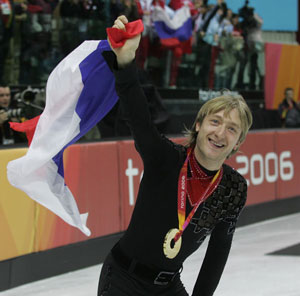
|
|
|||
During the day and a half separating men's free program from the short program, probably more things were written about Plushenko that in his entire life. What was there to discuss? Could that be any illusion after he created a 10 points advantage? Johnny Weir was right when he said that even if Plushenko falls three times in the free program, it's not that fact that someone else would be able to get the gold. However, this win-win situation made the observers turn to the first day events again and again like there was something wrong in Plushenko's killer advantage. After the short program, Brian Joubert said, «I saw how Plushenko skated. He did a great quad in the combination, but the combination itself wasn't clean enough. Giving ninety something points for this program is too much». I think judges were the first to realize something that became clear for everyone else only after the final. In Plushenko, the skating world got not just a great skater, but also a genius. You can't measure a genius. No matter how many points you give, it won't be enough. It's the fate that skaters like that, just like all gifted people, are constantly under a close attention. It's uncharacteristic of them to go the familiar road even though looking for the new road is not always becomes a success on the first try. Moreover, when there is a person who got so much of the God-given talent, there is always wild and often hidden jealousy from those who think they are just as talented. Kurt Browning commented on the Russian's program, «Plushenko skates like a carpenter who is building a house. He puts up the base and puts the boards around it, nailing them here and there. Johnny Weir and Stephane Lambiel look more like the artists who decorate their houses with different colors». Browning's words can be interpreted differently - Plushenko is completely different, he is not like everyone else. Some can't stand him, and some admire him. This also is an attribute of a genius. In any other sport, nobody cares how the champion won - whether he demonstrated the perfect technique on the distance, or raced to the finish line on the bended legs, what result he showed. Important is that he was first. It's not his problems if the rivals stepped aside of some reason. Figure skating is a different story. There is a demand for a champion to have it all - the best choreography, the couture costume, the supper difficult program, and the perfect performance. Plushenko's goal in Torino was simple - to win at any cost. The shortest way to it was just throwing away the most difficult components from the free program, just like Alexei Urmanov threw away his quad in Lillehammer sine it wasn't necessary. One small detail: the starting order. Urmanov skated after all the contenders, and Plushenko had to be the first one in the final group. Many thought Evgeni had to risk it all despite being far ahead of the competition. He didn't go for it. Quad-triple-double was the top of the difficulty. Everything else was done so carefully, it was clearly what the coach ordered - not an ounce of risk, not a move that could cause a mistake. Only once he wasn't exact, double the triple flip at the very end, but it completely didn't mater. It was more than enough for the gold. 2006
|
